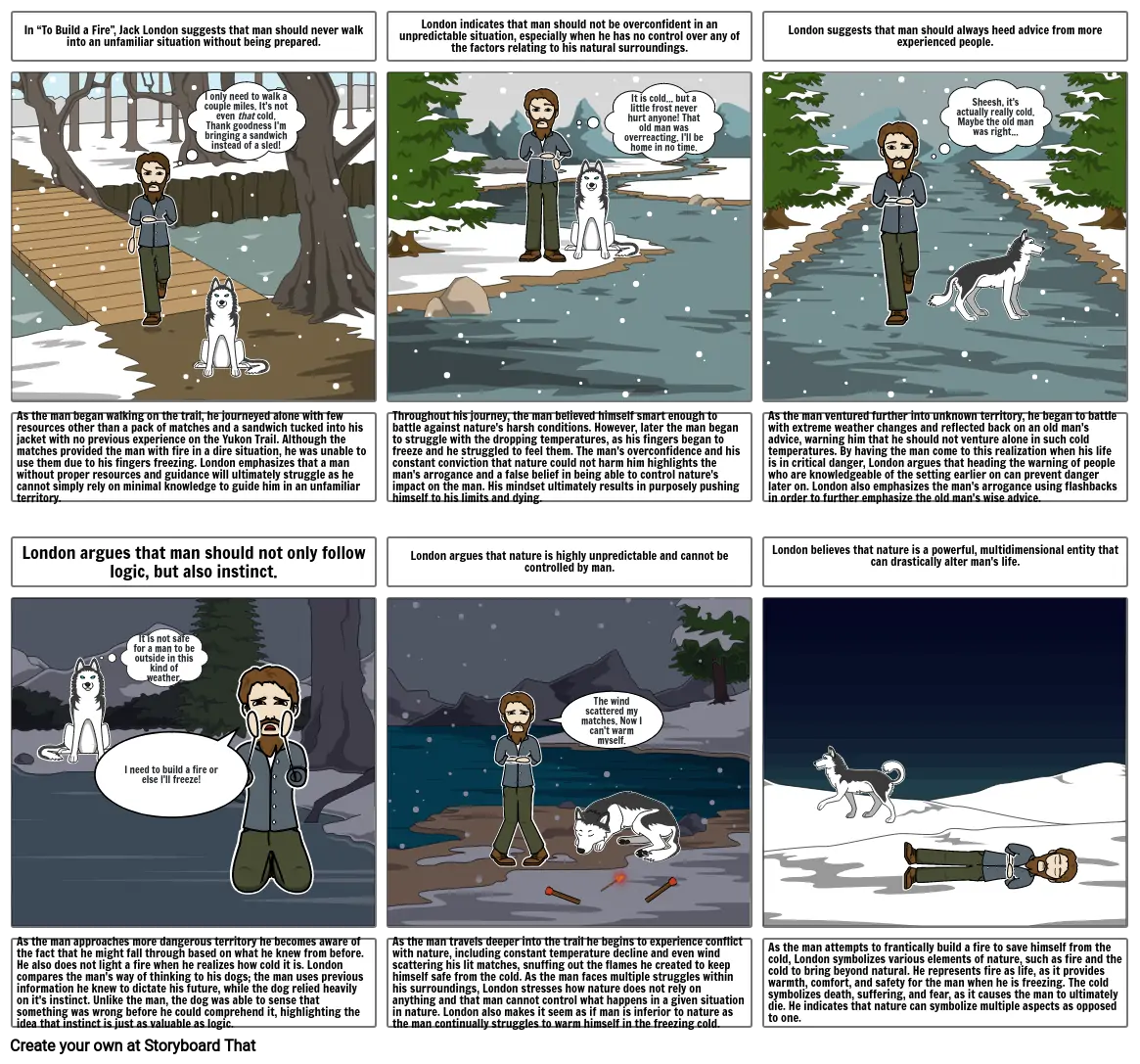To Build a Fire

Siužetinės Linijos Tekstas
- In “To Build a Fire”, Jack London suggests that man should never walk into an unfamiliar situation without being prepared.
- I only need to walk a couple miles. It's not even that cold. Thank goodness I'm bringing a sandwich instead of a sled!
- London indicates that man should not be overconfident in an unpredictable situation, especially when he has no control over any of the factors relating to his natural surroundings.
- It is cold... but a little frost never hurt anyone! That old man was overreacting. I'll be home in no time.
- London suggests that man should always heed advice from more experienced people.
- Sheesh, it's actually really cold. Maybe the old man was right...
- As the man began walking on the trail, he journeyed alone with few resources other than a pack of matches and a sandwich tucked into his jacket with no previous experience on the Yukon Trail. Although the matches provided the man with fire in a dire situation, he was unable to use them due to his fingers freezing. London emphasizes that a man without proper resources and guidance will ultimately struggle as he cannot simply rely on minimal knowledge to guide him in an unfamiliar territory.
- London argues that man should not only follow logic, but also instinct.
- It is not safe for a man to be outside in this kind of weather.
- Throughout his journey, the man believed himself smart enough to battle against nature's harsh conditions. However, later the man began to struggle with the dropping temperatures, as his fingers began to freeze and he struggled to feel them. The man's overconfidence and his constant conviction that nature could not harm him highlights the man's arrogance and a false belief in being able to control nature's impact on the man. His mindset ultimately results in purposely pushing himself to his limits and dying.
- London argues that nature is highly unpredictable and cannot be controlled by man.
- As the man ventured further into unknown territory, he began to battle with extreme weather changes and reflected back on an old man's advice, warning him that he should not venture alone in such cold temperatures. By having the man come to this realization when his life is in critical danger, London argues that heading the warning of people who are knowledgeable of the setting earlier on can prevent danger later on. London also emphasizes the man's arrogance using flashbacks in order to further emphasize the old man's wise advice.
- London believes that nature is a powerful, multidimensional entity that can drastically alter man's life.
- As the man approaches more dangerous territory he becomes aware of the fact that he might fall through based on what he knew from before. He also does not light a fire when he realizes how cold it is. London compares the man's way of thinking to his dogs; the man uses previous information he knew to dictate his future, while the dog relied heavily on it's instinct. Unlike the man, the dog was able to sense that something was wrong before he could comprehend it, highlighting the idea that instinct is just as valuable as logic.
- I need to build a fire or else I'll freeze!
- As the man travels deeper into the trail he begins to experience conflict with nature, including constant temperature decline and even wind scattering his lit matches, snuffing out the flames he created to keep himself safe from the cold. As the man faces multiple struggles within his surroundings, London stresses how nature does not rely on anything and that man cannot control what happens in a given situation in nature. London also makes it seem as if man is inferior to nature as the man continually struggles to warm himself in the freezing cold.
- The wind scattered my matches. Now I can't warm myself.
- As the man attempts to frantically build a fire to save himself from the cold, London symbolizes various elements of nature, such as fire and the cold to bring beyond natural. He represents fire as life, as it provides warmth, comfort, and safety for the man when he is freezing. The cold symbolizes death, suffering, and fear, as it causes the man to ultimately die. He indicates that nature can symbolize multiple aspects as opposed to one.
Sukurta daugiau nei 30 milijonų siužetinių lentelių

